-
The Last Days of Old BeijingLife in the Vanishing Backstreets of a City Transformed
Book Mansion was overwhelming. China’s largest bookstore occupied 172,000 square feet and carried 230,000 titles. Bestsellers included Chinese titles such as I Was an American Police Officer; I’m Only Raising You for 18 Years; Chinese-Style Divorce; and Harvard Girl, a memoir that revealed the parenting style that made her stand out from her Chinese classmates and gain acceptance to the school. That book was in its sixty-third printing.
Downstairs, Monica’s Story lay between Bill and Hillary Clinton’s autobiographies. A boxed set about Göring rubbed shoulders with What’s Behind Jewish Excellence? Translated American titles ranged from the predictable – The Da Vinci Code, The Atkins Diet—to the surprising—Henry Rollins’s Get in the Van, and a Woody Allen collection whose Chinese title promised MENSA Whores. An entire floor held English-learning materials. Love English taught pickup lines and pillow talk, including cultural hints such as “‘I’m bored’ really means ‘Do you want to have sex?’”
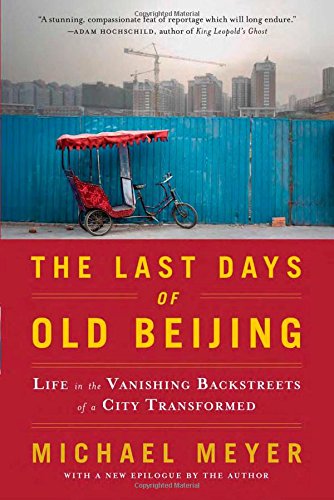 The Last Days of Old Beijing : Life in the Vanishing Backstreets of a City Transformed
The Last Days of Old Beijing : Life in the Vanishing Backstreets of a City Transformed -
The Last Days of Old BeijingLife in the Vanishing Backstreets of a City Transformed
The students’ determination to show their best faces to the world in 2008 never waned. They were embarrassed to tell people they were unemployed or laid-off, or retired even, and so we practiced “I am a grandmother!” as a reply to inquiries about their profession.
One afternoon, a row of rickshaw bicycles pedaled through our hutong, bearing German tourists, who pointed their camera lenses at decrepit doorways.
“Why do foreigners want to take pictures of a poor neighborhood?” the class asked. “Don’t they want to go to the Forbidden City? Are they laughing at us?”
 The Last Days of Old Beijing : Life in the Vanishing Backstreets of a City Transformed
The Last Days of Old Beijing : Life in the Vanishing Backstreets of a City Transformed -
The Last Days of Old BeijingLife in the Vanishing Backstreets of a City Transformed
Each of the lanes framed an area the size of a football field. The rows were unlit, save for the bare sodium bulbs illuminating the scale before every shack. Recyclers bought refuse from individuals in the city, then trucked it out here after dark to sell it at a markup. Profit came from volume. Recycler Wang paid one fen ($.0013) per twelve-ounce plastic mineral-water bottle in town and received 1.5 fen ($.0020) for it here. If he bought a thousand bottles for $1.30, he could sell them for $2. The earned $.70 was the equivalent of a little over five yuan, the cost of a bowl of noodles.
 The Last Days of Old Beijing : Life in the Vanishing Backstreets of a City Transformed
The Last Days of Old Beijing : Life in the Vanishing Backstreets of a City Transformed
-
Dear Blackbird,PoemsFrom"Lamentations"
Whitman kept all the sleepers to himself but one, & she wasn’t just a demon
in the sack. When she wasn’t sleeping by daylight, she was the demon
slinging a house shoe at her children over the front seat of the Plymouth
while simultaneously steering it between the orgasmic, careening semis &
Beetle Bug Blue, Piddiddle, Beetle Bug Black.
 Dear Blackbird, : Poems
Dear Blackbird, : Poems -
Dear Blackbird,PoemsFrom"The Very Best Woman in All the World"
The very best woman in all the world
auditions for Juliet’s part.
But blinded by spotlights
on the silver gilt balcony, she leans too
far out over the set &,
hand over heart, plunges
into the orchestra pit. That is the way
of answering love letters
voiced up from the dark –
 Dear Blackbird, : Poems
Dear Blackbird, : Poems -
Dear Blackbird,PoemsFrom"The Borrowed Wife"
The husband is a figment of the imagination: Continually wearing a rented
tux & clipping new boutonnières from the neighbor’s garden. He
is as the mayfly who exists for 24 hours then dies
to be replaced with his identical self. He is everything that arrives on time
& in his suitcase he stores enough glass slippers to fit anysized foot.
You will know him by his locks: Bronze.
 Dear Blackbird, : Poems
Dear Blackbird, : Poems
-
Things That AreEssaysFrom"In Which the River Makes Off with Three Stationary Characters"
In the seventeenth century, his Holiness the Pope adjudged beavers to be fish. In retrospect, that was a zoologically illogical decision; but beavers were not miffed at being changed into fish. They decided not to truckle their new specification, not to be perfect fish, textbook fish; instead they became fanciful fish, the first to have furry babies, the first to breathe air and the first fish to build for themselves commodious conical fortresses in the water.
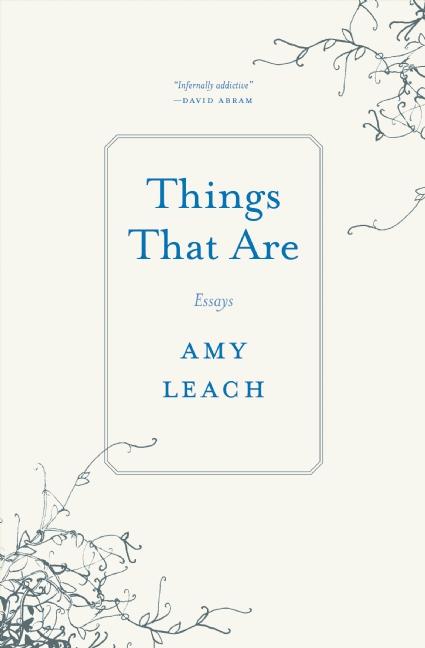 Things That Are : Essays
Things That Are : Essays -
Things That AreEssaysFrom"Talent"
Frogs are too pretty for anyone to seriously believe that they disdain attention, but many frogs when they sleep try to screen themselves behind leaves and rocks, to hide from people who want to poison each other with frog poison; or people who want to cremate them into frog ash, which, when worn around the neck, foils the plague; or frog-sucking people who wish to baffle themselves, or to anesthetize an aching tooth, or to forget yesterday by toxifying their heart muscles.
 Things That Are : Essays
Things That Are : Essays -
Things That AreEssaysFrom"Sail On, My Little Honeybee"
To get an idea of the relationship between the Earth and the Moon and the Sun, find two friends and have the self-conscious one with lots of atmosphere be the Earth and the coercive one be the Sun. And you be the Moon, if you are periodically luminous and sometimes unobservable and your inner life has petered out. Then find a large field and take three steps from the Earth, and have the Sun go a quarter mile away.
 Things That Are : Essays
Things That Are : Essays
-
The PossessedAdventures with Russian Books and the People Who Read Them
“The American girl will judge the leg contest!” they announced. I was still hoping that I had misunderstood them, even as German techno music was turned on and all the boys in the camp, ages eight to fourteen, were paraded out behind a screen that hid their bodies from the waist up; identifying numbers had been pinned to their shorts. I was given a clipboard with a form on which to rate their legs on a scale from one to ten. Gripped by panic, I stared at the clipboard. Nothing in either my life experience or my studies had prepared me to judge an adolescent boys’ leg contest. Finally the English teacher, who appeared to understand my predicament, whispered to me some scores of her own devising, and I wrote them on the form as if I had thought of them myself.
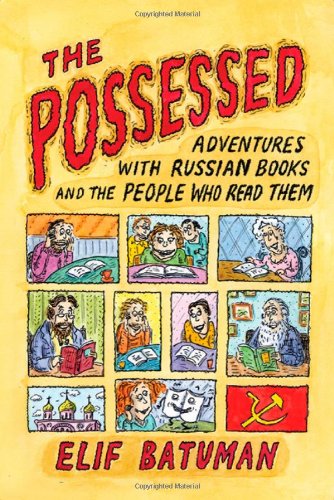 The Possessed : Adventures with Russian Books and the People Who Read Them
The Possessed : Adventures with Russian Books and the People Who Read Them -
The PossessedAdventures with Russian Books and the People Who Read Them
Chekhov was nine years old when War and Peace was published. He admired Tolstoy tremendously and longed to meet him; at the same time, the prospect of this meeting filled him with such alarm that he once ran out of a bathhouse in Moscow when he learned that Tolstoy was also there. Chekhov did not want to meet Tolstoy in the bath, but this apparently was his inescapable destiny. When at last he worked up the nerve to go to Yasnaya Polyana, Chekhov arrived at the exact moment when Tolstoy was headed to the stream for his daily ablutions. Tolstoy insisted that Chekhov join him; Chekhov later recalled that, as he and Tolstoy sat naked in the chin-deep water, Tolstoy’s beard floated majestically before him.
 The Possessed : Adventures with Russian Books and the People Who Read Them
The Possessed : Adventures with Russian Books and the People Who Read Them -
The PossessedAdventures with Russian Books and the People Who Read Them
Today, Russians remember Empress Anna primarily for her love of jesters, dwarfs, and Germans, all of whom enter into her biography at an early point. In 1710, when Anna was seventeen, her uncle Peter the Great arranged her marriage to Duke Friedrich Wilhelm, the German ruler of the small duchy of Courland: a strategic alliance, intended to bolster Russia’s support of Courland against its big neighbors, Prussia and Poland. At the wedding banquet, the tsar cut open two pies with his dagger. A splendidly dressed dwarf jumped out of each pie and together they danced a minuet on the table. The next day, Peter treated his guests to a second wedding: that of his favorite dwarf, attended by forty-two other dwarfs from all corners of the empire. Some foreign guests saw a certain symmetry in the double wedding, one between two miniature people, the other between two pawns in the great game of European politics.
 The Possessed : Adventures with Russian Books and the People Who Read Them
The Possessed : Adventures with Russian Books and the People Who Read Them
-
Punching OutOne Year in a Closing Auto PlantFrom"Settle Labor Issues"
Like the liftoff of an airliner, the stamping of auto body parts requires inhuman force, producing decibels registered by your internal organs. The presses sound, unmistakably, as if they could kill you, which they could, without much interrupting their normal functioning. You’d notice the collision more than they would.
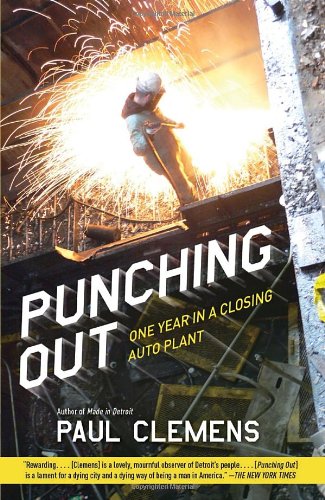 Punching Out : One Year in a Closing Auto Plant
Punching Out : One Year in a Closing Auto Plant -
Punching OutOne Year in a Closing Auto PlantFrom"Assets Formerly of Budd Company Detroit"
You didn’t need to shave, shower, brush your teeth, or wash your clothes before work; you didn’t need to worry about your beer breath, your BO, your black eye, your smoking, your burping, your farting, your constant fucking cursing. Pretty much anything your body could do, you could do with impunity in the plant, which made its own sounds and smells, masking yours. The plant felt like a frat house, but of a peculiar, contradictory kind—one for men who had never set foot on a college campus.
 Punching Out : One Year in a Closing Auto Plant
Punching Out : One Year in a Closing Auto Plant -
Punching OutOne Year in a Closing Auto PlantFrom"Picking the Carcass"
“This”—he pointed to the boring mill’s base—“is the last machine tool in this shop.” He looked around the nearly empty plant. “Hundreds, thousands of industrial buildings are for sale in metro Detroit,” he said. “What does that tell you about the future of the middle class?”
 Punching Out : One Year in a Closing Auto Plant
Punching Out : One Year in a Closing Auto Plant
-
Harlem Is NowhereA Journey to the Mecca of Black AmericaFrom"Harlem Dream Books"
In this dream Harlem, the avenues are even wider and more grand. I visit elegant lounges that have mahogany fittings and floor-to-ceiling windows that open onto the avenue—striped silk curtains billow in the breeze. In that dream Harlem, that nowhere Harlem, I reach the campus of City College by ascending the face of a ragged cliff many times more treacherous than the steps of St. Nicholas Park. In these settings unfold various plots of which I am not quite the author.
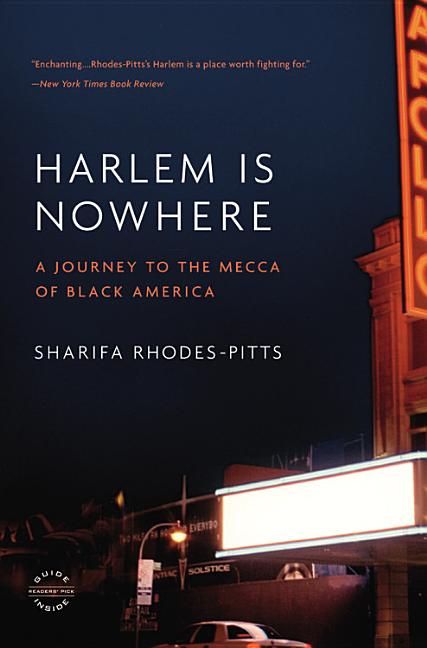 Harlem Is Nowhere : A Journey to the Mecca of Black America
Harlem Is Nowhere : A Journey to the Mecca of Black America -
Harlem Is NowhereA Journey to the Mecca of Black AmericaFrom"Message"
A man came up to the row of benches and began dashing back and forth in front of us, and then into and out of the street. He was dressed in athletic clothes and possessed by a remarkable purpose: he was shadowboxing while delivering rhyming couplets.
 Harlem Is Nowhere : A Journey to the Mecca of Black America
Harlem Is Nowhere : A Journey to the Mecca of Black America -
Harlem Is NowhereA Journey to the Mecca of Black AmericaFrom"We March Because…"
… there they are marching, and there is the man who brings a van from North Carolina loaded with sausage links, boiled peanuts, pickled eggs, and peaches and sorghum syrup and collard greens, which he sells from the street. There are the girls playing double-dutch, there is that man who kept a tiger in his apartment, and yes, oh, there is Bill Clinton, we see him so infrequently at his office on 125th Street! There is this week’s winner of Amateur Night at the Apollo, there are the Korean American owners of Harlem’s most popular chain of soul-food buffet restaurants, there are those socialites going to the fabulous Harlem Renaissance parties, which I am quite tired of hearing about. They are all gathered at the parade.
 Harlem Is Nowhere : A Journey to the Mecca of Black America
Harlem Is Nowhere : A Journey to the Mecca of Black America
Selected Works
read more >-
Love for Sale and Other EssaysFrom"Dreams of Laura"
At my desk, with my pen, pencil, markers, ruler, and thick white paper, I was in command. And when I drew the superhero who was my alter-ego, I gave him —i.e., myself—what in all my shyness I didn’t have: a girlfriend. She was as pretty as my limited skills could make her. Her name was Laura.
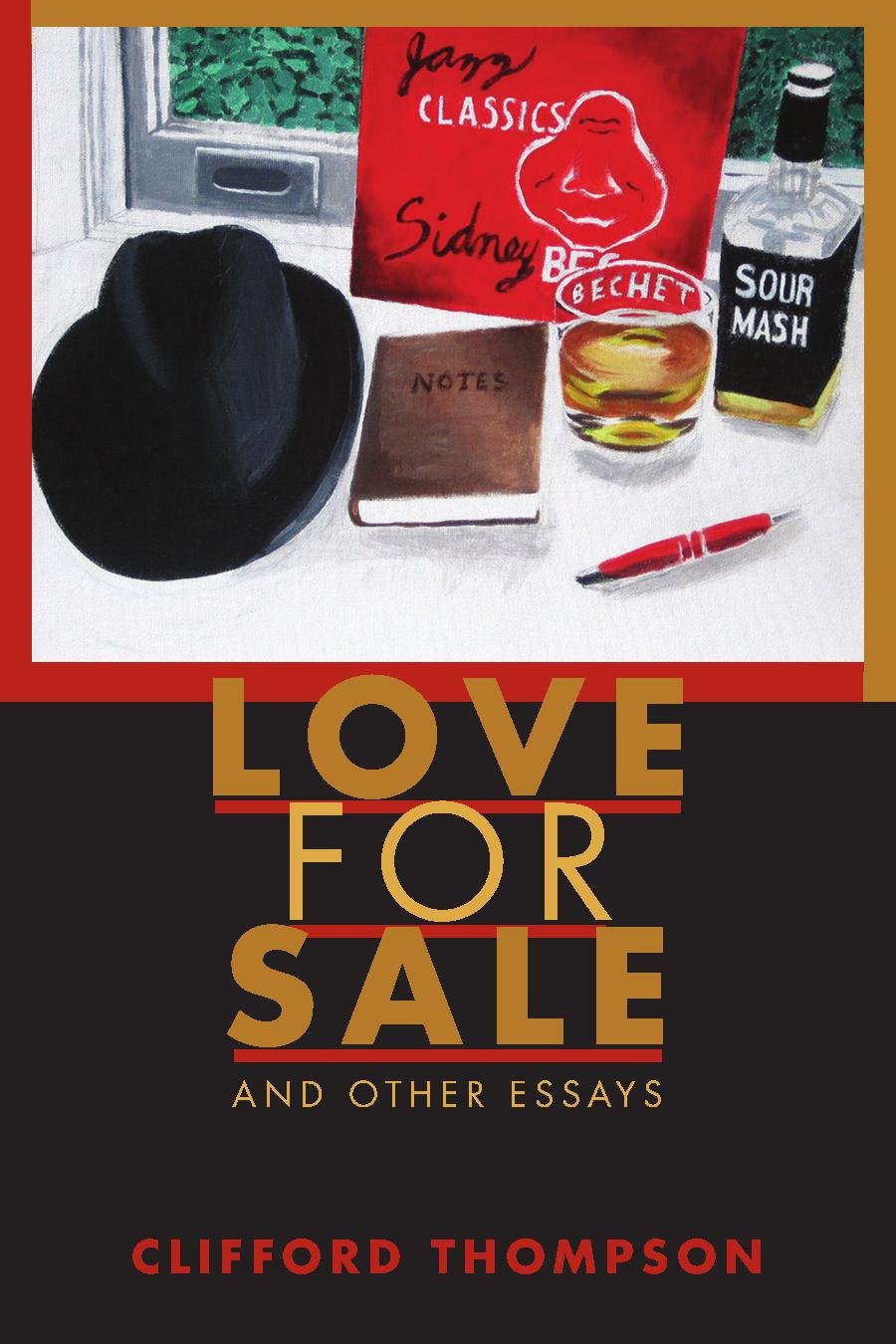 Love for Sale : And Other Essays
Love for Sale : And Other Essays -
Love for Sale and Other EssaysFrom"On Jazz: Notes of an Enthusiast"
A major difference between the trumpet and the sax has to do with adaptability. In the right hands, the saxophone—baritone, tenor, alto, or soprano—becomes an extension of the person playing it; the trumpet remains the trumpet.
 Love for Sale : And Other Essays
Love for Sale : And Other Essays -
Love for Sale and Other EssaysFrom"For Bean"
For a child there is nothing like such talk among adults, even if the child is not listening or consciously aware of hearing it. What are important are not so much the words as the tide of sound on which they reach the ear: the low, whiskey-and tobacco-tinged voices of the men; the knowing tones of the women—sounds that tell a small boy, as he plays on the floor with plastic soldiers, that while he may not understand the workings of the world, he is in the care of people who do.
 Love for Sale : And Other Essays
Love for Sale : And Other Essays
-
RuinsSelected EssaysFrom"Winter"
… I used to love it when it would rain in Los Angeles. I felt that the city was made suddenly reflective by the rain, that it was being coated in another, deeper layer of what it was by the falling moisture. It made me sad and that pleased me. It was a moment of relief from what I took to be the exhausting project of pretending to be happy all of the time.
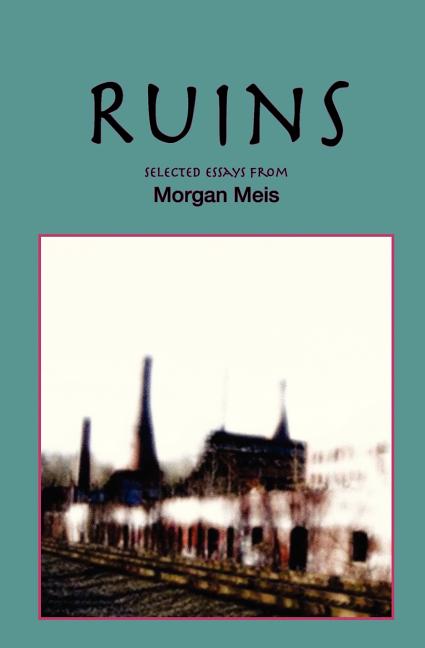 Ruins : Selected Essays
Ruins : Selected Essays -
RuinsSelected EssaysFrom"Ruins"
As you stand near a pool of fetid water outside one of these crumbling factories you realize that the era of the Industrial Revolution (at least in this part of the world) is truly dead, never to be recovered. It is, thus, possible to visit the Rust Belt with the same mood one would visit the chateaus of France or the medieval cities of Spain. You are looking at the remains of a civilization that has passed away. We are not ready, perhaps, to think about visiting Detroit in the same way that we would visit the Palais des Papes in Avignon. But what, really, is the difference?
 Ruins : Selected Essays
Ruins : Selected Essays -
RuinsSelected EssaysFrom"A Tribute to European Trains Twenty or Thirty Years Old"
Europe is a train. The countries are all so close together, train close. A plane is too fast. You must fly over vast quantities of land or sea to get something out of an airplane ride. You have to stare out the window for hours at the unchanging surface of the ocean or the mesmerizing openness, for instance, of the American plains. To understand space in Europe you have to be on a train.
You sit near the window in your compartment. There are the forward-sitters and the backward-sitters. Both have their logic. Forward-sitters like to see what is coming, they tend to feel positive about the European Union. Backward-sitters are a more melancholy lot. They think of Europe as something you grab glimpses of after the fact, after it has already passed us by. Thus we see that space has something to do with time.
 Ruins : Selected Essays
Ruins : Selected Essays